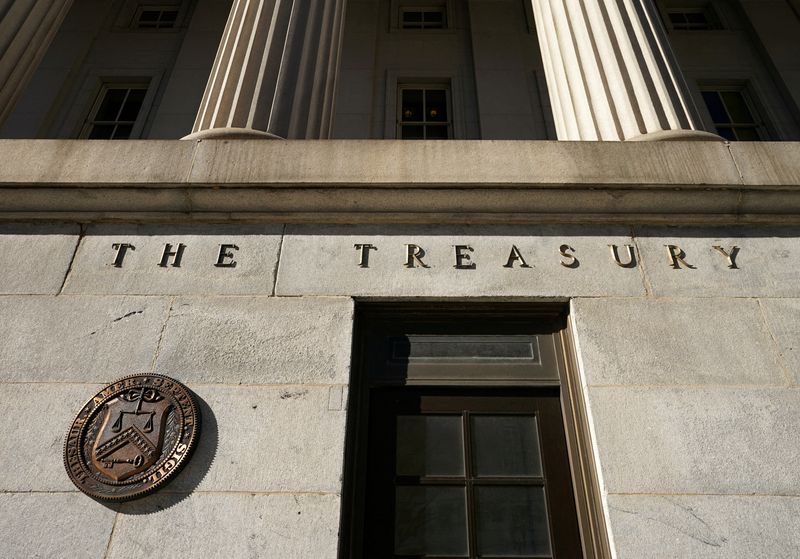By Sarupya Ganguly
BENGALURU (Reuters) - Bond strategists upgraded their U.S. Treasury yield forecasts for coming months to their highest since at least November amid sticky inflation and greater conviction in financial markets of fewer Federal Reserve rate cuts this year, a Reuters poll found.
After hitting a cycle peak of 5.02% in October 2023, the benchmark U.S. 10-year Treasury yield plummeted over 110 basis points by year-end as traders rapidly priced in nearly 150 basis points of Fed interest rate cuts in 2024.
Persistent inflation and strong U.S. economic data have forced markets to dramatically delay those rate cut bets and slash 2024 rate cut pricing to roughly 50 basis points.
Ten-year yields, which move inversely to price, have surged roughly 70 basis points from a recent low of 3.78% in late December back to 4.48% currently.
But asked whether 10-year yields would revisit their cycle high in the coming three months, a near-90% majority of fixed income strategists in a May 7-14 Reuters poll, 23 of 27, said that was unlikely.
However, for three consecutive monthly surveys prior to the 10-year yield hitting its cycle-peak last year, a similar group of forecasters said they believed it had already peaked.
"In order for the 10-year yield to test cycle-highs, you would need to see expectations for a rate hike to come back on the table, and to a much larger extent than they are today," said Mark Cabana, head of U.S. rates strategy at Bank of America.
"(Fed chair) Powell continues to tell us there are seemingly low odds of an additional rate hike in this cycle, and we agree with that," he added.
Interest rate futures traders see almost no chance of a Fed rate hike by year-end and now see the first cut in September, half a year later than markets' January pricing of a March cut.
Economists, who as a group never saw March as the most likely outcome, upgraded their inflation forecasts for a second straight month in a separate survey published on Monday.
Bond strategists in the latest poll pulled up their median end-July forecast to 4.40% - a 25 basis point upgrade from last month and 53 basis points higher than in a February survey.
The yield is forecast to fall to 4.25% in six months, still 25 basis points higher than the April poll.
"We look for Treasury yields to decline only slightly by the end of the year simply because we expect to see a bit of a soft patch in the economy - not a recession or anything - just some weakening, giving the Fed enough room to get a cut or two in," said Brian Rehling, head of global fixed income strategy at the Wells Fargo Investment Institute.
"The main thing to look for is if inflation doesn't moderate as fast as the Fed's expecting and the economy remains strong...the 10-year could retest highs around 4.75% or even push up to 5%," he added.
The interest-rate sensitive 2-year note yield, currently 4.84%, would fall to 4.72% in three months and then to 4.45% in six, poll medians showed - both 30+ bps upgrades from the April survey.

Asked what was more likely for the U.S. yield curve over the coming three months, about half the respondents, 12 of 27, said it would 'bull steepen', led by short-term bond yields declining more than long-term ones.
Seven said 'bear steepening' was more likely, five said 'bull flattening', while three said 'bear flattening'.